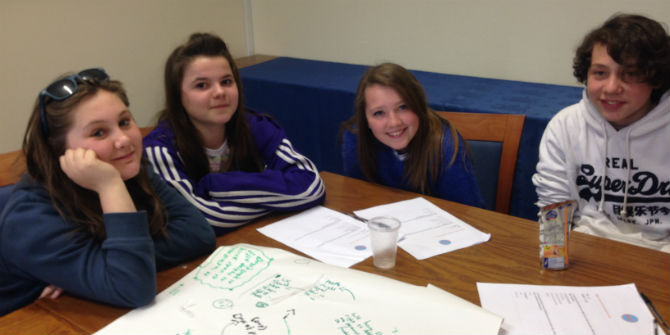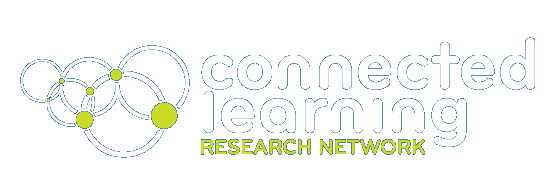Young juries want a fair internet: deliberating over digital rights
July 17, 2015
PROJECTS: Preparing for a Digital Future The Class
TAGS: Digital Rights
Sonia Livingstone recently had the chance to listen to young people deliberate their online rights. Young people, just like adults, are trying to work out the digital environment for themselves and Sonia discusses some of their suggestions, anxieties and frustrations. Sonia is Professor of Social Psychology at LSE’s Department of Media and Communications and has more than 25 years of experience in media research with a particular focus on children and young people. She is the lead investigator of the Parenting for a Digital Future research project.
Should children and young people have dedicated provision for their online rights – to know who has their information, or to remove content they may later regret? Such questions are hotly debated by adults – whether parents, the general public or stakeholders from industry or government. It isn’t always recognised, however, that young people also have thoughtful and nuanced responses to real-life dilemmas about digital rights, whether these are implemented for everyone, or whether they are particular to young people.
Youth citizens’ juries
I recently had the chance to observe the youth citizens’ juries being organised by iRights, together with the Universities of Leeds and Nottingham, to deliberate over what children (aged 12-17) think of their rights online. It’s often inspiring to listen to young people talking seriously about something that matters to them. And if they know their views are valued, especially if their views will feed into policy and practice, they are very ready to consider all sides of the issue.
The deliberations that I listened to – a couple out of a series being held around the country to generate new proposals for implementing users’ rights online – took their responsibility to deliberate on complex matters very conscientiously. They certainly don’t rush to simplistic judgements, and nor do they all agree with each other. For example, on the so-called right to remove or delete, we heard powerful arguments for and against, with young people listening to each other, considering some thorny case studies, willing to change their minds in the face of a strong argument. One group first argued that it wasn’t fair that something you posted when you were too young to know better had adverse consequences when older. But then someone else spoke up to suggest it was a lie to delete something you did when you were younger. Both sides of the argument were then carefully considered, though it seemed the latter view won the day.

Credit: S. Livingstone
Although the whole point of the juries is to give young people space to express complex views, a few summary thoughts occurred to me while listening to them:
- Young people want the internet to treat them fairly. ‘It’s not fair’ was a common refrain through the discussions, but this was far from a childish complaint. Many adults would agree that it isn’t fair to find your details being collected without your express permission. Or to be faced with incomprehensible ‘terms and conditions’ before joining a site. Or to find yourself on an adult site without any advance warning. Or to have your data shared across companies without realising this would happen.
- The morals young people live by offline should also apply online. ‘Tell people what’s going to happen and how they will be treated.’ ‘Give people a second chance or a right of redress.’ ‘Act responsibly about yourself and others.’ ‘If you make a mistake, try to put it right, but if you can’t, be ready to “live with the consequences”.’ ‘Make it clear what your options are and how to enact your rights.’ And so on.
- Young people want the internet to be more ‘human’. Offline, there’s a bit of give and take, opportunities to renegotiate a social situation, and to recover lost dignity or respect. But when young people try to apply their moral vision and their developing social skills to interactions on the internet, they find it an unresponsive and unforgiving place. No wonder that the groups wanted more human intervention in the dealings of the internet – for example, a moderation board to check sites’ practices, independent advisers or appeal processes.
- Pop-ups to let you know the risks and how your data’s being used. When it became clear to the young people that such human (and humane) interventions may not be forthcoming, they had another interesting idea, this time technological, automated (and thus far cheaper). While site designers often aim for a seamless experience online, the young people spontaneously called for interruptions to this experience. So they asked for pop-ups to remind them of the risks of posting or sharing information, just-in-time reminders or health warnings about the kind of site they were entering or what age group it was meant for. Timely prompts to let you know when you’ve spent a long time on a gaming site that it might be good to do something else. Clear and prominent ‘terms and conditions’, tick boxes to opt out of data collection, and visible contact information for complaints or support or requests to remove information.
Coping with online risk
This discussion offers a window into the conversations young people are clearly having among themselves all the time – sometimes with anxiety, sometimes with puzzlement or frustration – trying, like adults, to work out the digital environment for themselves. This sense of an ongoing conversation is also what we heard in the EU Kids Online network when researching how and why children turn to their peers, well ahead of asking a parent or teacher, to help them figure out how to cope with online risk.
Part of what seems unfair, I suggest, is that they would like to be resourceful and self-reliant in their internet use too. But if they feel they’re not being told what they need to know, and not given the resources they need, they feel undermined in this surely laudable effort. To the industry and government, who wish to encourage trust in the internet, it is in their interest to treat children and young people with respect. Yet there are still too many stakeholders ready to assume they know what young people think rather than consulting them directly.


